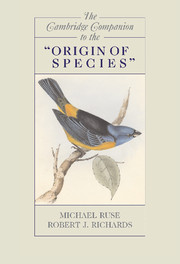Book contents
- Frontmatter
- Foreword
- Introduction
- 1 The Origin of the Origin
- 2 Darwin’s Analogy between Artificial and Natural Selection in the Origin of Species
- 3 Variation and Inheritance
- 4 Darwin’s Theory of Natural Selection and Its Moral Purpose
- 5 Originating Species: Darwin on the Species Problem
- 6 Darwin’s Keystone: The Principle of Divergence
- 7 Darwin’s Difficulties
- 8 Darwin’s Geology and Perspective on the Fossil Record
- 9 Geographical Distribution in the Origin of Species
- 10 Classification in Darwin’s Origin
- 11 Embryology and Morphology
- 12 Darwin’s Botany in the Origin of Species
- 13 The Rhetoric of the Origin of Species
- 14 “Laws impressed on matter by the Creator”? The Origin and the Question of Religion
- 15 Lineal Descendants: The Origin’s Literary Progeny
- 16 The Origin and Political Thought: From Liberalism to Marxism
- 17 The Origin and Philosophy
- 18 The Origin of Species as a Book
- Bibliography
- Index
3 - Variation and Inheritance
Published online by Cambridge University Press: 28 January 2009
- Frontmatter
- Foreword
- Introduction
- 1 The Origin of the Origin
- 2 Darwin’s Analogy between Artificial and Natural Selection in the Origin of Species
- 3 Variation and Inheritance
- 4 Darwin’s Theory of Natural Selection and Its Moral Purpose
- 5 Originating Species: Darwin on the Species Problem
- 6 Darwin’s Keystone: The Principle of Divergence
- 7 Darwin’s Difficulties
- 8 Darwin’s Geology and Perspective on the Fossil Record
- 9 Geographical Distribution in the Origin of Species
- 10 Classification in Darwin’s Origin
- 11 Embryology and Morphology
- 12 Darwin’s Botany in the Origin of Species
- 13 The Rhetoric of the Origin of Species
- 14 “Laws impressed on matter by the Creator”? The Origin and the Question of Religion
- 15 Lineal Descendants: The Origin’s Literary Progeny
- 16 The Origin and Political Thought: From Liberalism to Marxism
- 17 The Origin and Philosophy
- 18 The Origin of Species as a Book
- Bibliography
- Index
Summary
Darwin signaled the preeminent importance of natural selection in both the title and subtitle of his book the Origin of Species. But without variation as the raw material upon which selection can act and inheritance as the means for preserving favorable variations in the future, natural selection would not lead to the genesis of new species. How, then, did Darwin present these two topics in the Origin? Answering this question will require textual analysis of the first edition of the Origin, including some reference to changes in later editions, and a little indulgence in somemore speculative discussion of the subject. The chapter will address the following questions:
Why did Darwin privilege variation in 1859?
Why did he hold that changes in the conditions of life provide the chief raw material for evolution?
Had Darwin known of Mendel’s critique of his work, how might the sixth edition of the Origin have differed from what was published?
INTRODUCTION
To the contemporary reader with some knowledge of modern biology, the crucial importance of heritable variation to the theory of species transmutation has no need of justification. It is obvious. Yet Darwin’s manner of presenting it and the theoretical stance he adopted must seem strange, even extraordinary.
- Type
- Chapter
- Information
- The Cambridge Companion to the 'Origin of Species' , pp. 30 - 46Publisher: Cambridge University PressPrint publication year: 2008
- 1
- Cited by



